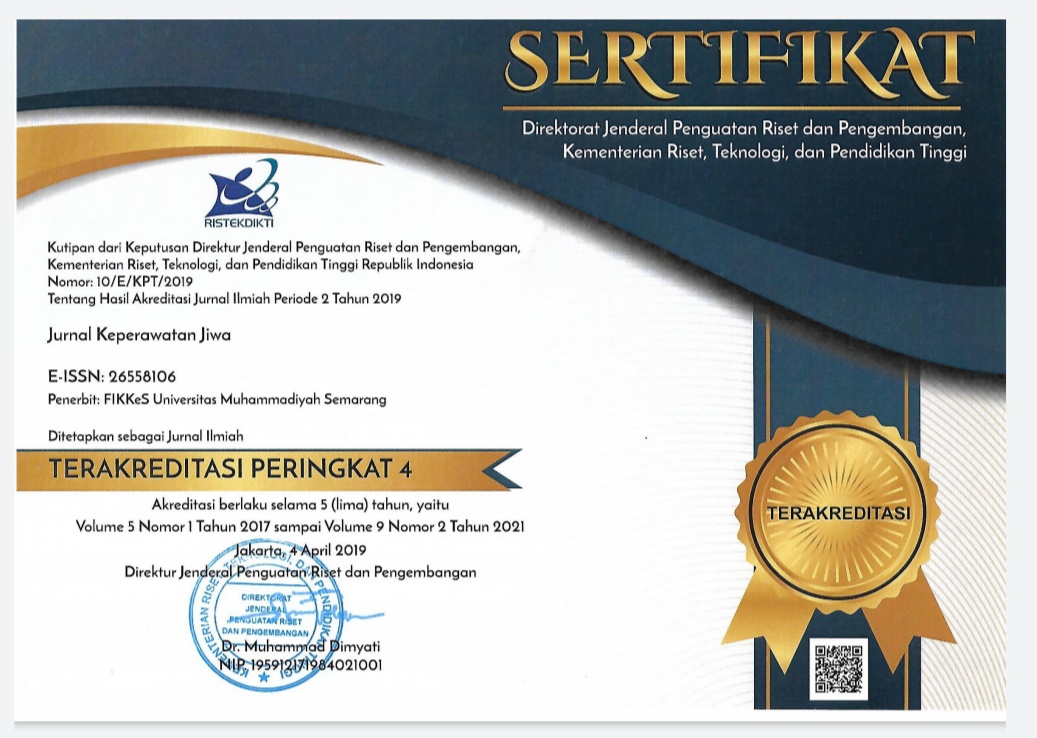Kepercayaan Diri Ibu Berhubungan dengan Perkembangan Anak Usia Pra Sekolah
(1) Fakultas Kesehatan, Prodi Ilmu Keperawatan, Universitas Kristen Indonesia Maluku
(2) Fakultas Kesehatan, Prodi Ilmu Keperawatan, Universitas Kristen Indonesia Maluku
(*) Corresponding Author
Abstract
Ibu memiliki peranan yang sangat penting dalam setiap tahap perkembangan anak. Gangguan perkembangan bicara dan bahasa dialami oleh 8% anak usia prasekolah. Kepercayaan ibu akan kemampuannya untuk merawat anak-anaknya sangatlah diperlukan. Akibat dari kurangnya kepercayaan diri ibu akan mempengaruhi perkembangan anaknya. Tujuan penelitian adalah diketahuinya hubungan kepercayaan diri ibu dengan perkembangan anak usia prasekolah di Kelurahan Benteng Kecamatan Nusaniwe Kota Ambon. Metode : Jenis penelitian adalah cross sectional. Populasinya adalah seluruh anak prasekolah di kelurahan benteng dengan jumlah sampel sebesar 107 orang. Teknik pengambilan sampel dilakukan dengan cara purposive sampling. Uji yang digunakan adalah Chi Square. Instrumen yang digunakan adalah kuesioner yang telah diuji validitas dan reliabilitasnya. Hasil Penelitian menunjukkan bahwa jumlah ibu yang memiliki kepercayaan diri yang tinggi (50.5%) juga memiliki anak dengan tingkat perkembangan yang normal (61.7%). Hasil penelitian juga menunjukkan bahwa adanya hubungan antara kepercayaan diri ibu dengan perkembangan anak usia prasekolah (p = 0.001). Kepercayaan diri ibu memiliki peranan penting dan sangat berpengaruh terhadap perkembangan anak usia pra sekolah.
Kata kunci: anak usia pra sekolah, kepercayaan diri ibu, perkembangan anak, anak usia pra sekolah
THE RELATIONSHIP BETWEEN MOTHER CONFIDENCE WITH DEVELOPMENT OF PRE-SCHOOL AGE CHILDREN
ABSTRACT
Mothers have a very important role in each stage of child development. Speech and language developmental disorders are experienced by 8% of preschool age children. A mother's trust in her ability to care for her children is needed. As a result of lack of confidence in the mother will affect the development of their children. The purpose of this study was to determine the relationship of maternal confidence with the development of preschool age children in Benteng Subdistrict, Nusaniwe Subdistrict, Ambon City. Method: This type of research is cross sectional. The population is all preschool children in Benteng village with a total sample of 107 people. The sampling technique is done by purposive sampling. The test used is Chi Square. The instrument used was a questionnaire that had been tested for validity and reliability. The results showed that the number of mothers who had high self-confidence (50.5%) also had children with normal developmental levels (61.7%). The results also showed that there was a relationship between maternal confidence with the development of preschool children (p = 0.001). Mother's confidence has an important role and is very influential in the development of pre-school age children.
Keywords: child development,, mother's confidence, pre-school age children
Keywords
Full Text:
PDFReferences
Depkes. (2016). Profil Kesehatan RI 2015. In Profil Kesehatan Indonesia Tahun 2015. https://doi.org/10.1111/evo.12990
Dion, Y. (2013). Asuhan Keperawatan Keluarga Konsep Dan Praktik. In Asuhan Keperawatan Keluarga Konsep Dan Praktik.
Fajrah, R. (2017). Hubungan Pola Asuh Orang Tua dengan Perkembaangan Bahasa Anak Umur 4- 6 Tahun di PAUD Seruni dan Laut Biru Kelurahan Air Tawar.
Fasanghari, M., Kordi, M., & Asgharipour, N. (2019). Effect of maternal role training program based on Mercer theory on maternal self-confidence of primiparous women with unplanned pregnancy. Journal of Education and Health Promotion. https://doi.org/10.4103/jehp.jehp_202_17
Guyton and Hall. (2014). Guyton dan Hall Buku Ajar Fisiologi Kedokteran. In Elsevier, Singapore. https://doi.org/10.1016/B978-1-4160-5452-8.00020-2
Harrison, S. L. (2011). An intervention to test the adolescent maternal confidence learning model.
Henney, S. M. (2016). The Relationship Between Personality and Parental Confidence in Mothers of School-Aged Children. SAGE Open, 6(3). https://doi.org/10.1177/2158244016659317
Hushmillo, M. , 28(2), 46-48. (2013). Maternal Role Attainment Theory. International Journal of Childbirth Education.
Husmillo, M. (2013). Maternal Role Attainment Theory. International Journal of Childbirth Education.
Kurniawati, E., Rosra, M., & Utaminingsih, D. (2017). Hubungan antara Pola Asuh Orang Tua dengan Percaya Diri Siswa. ALIBKIN (Jurnal Bimbingan Konseling).
Livana, P. H., Armitasari, D., & Susanti, Y. (2018). Pengaruh Stimulasi Motorik Halus Terhadap Tahap Perkembangan Psikososial Anak Usia Pra Sekolah. Jurnal Pendidikan Keperawatan Indonesia, 4(1), 30-41. https://doi.org/10.17509/jpki.v4i1.12340.
Maryam. (2017). Gambaran Tingkat Pendidikan dan Pola Asuh Ibu pada Anak Usia Dini di Gampong Pante Gajah Kecamatan Matang Glumpang Dua Kabupaten Bireuen. 3(2), 67–76. Retrieved from https://jurnal.ar-raniry.ac.id/index.php/equality/article/view/3443/2400
Mercer, R. T. (2004). Becoming a mother versus maternal role attainment. Journal of Nursing Scholarship. https://doi.org/10.1111/j.1547-5069.2004.04042.x
Mouton, B., & Roskam, I. (2015). Confident Mothers, Easier Children: A Quasi-experimental Manipulation of Mothers’ Self-efficacy. Journal of Child and Family Studies. https://doi.org/10.1007/s10826-014-0051-0
Özkan, H., & Polat, S. (2011). Maternal identity development education on maternity role attainment and my baby perception of primiparas. Asian Nursing Research. https://doi.org/10.1016/S1976-1317(11)60019-4
Saleh, A. (2011). Keperawatan anak terhadap pengetahuan, kemampuan praktik dan percaya diri ibu dalam menstimulasi tumbuh kembang bayi 0–6 bulan. Jurnal Ners, Vol. 6(No.2 Oktober), 175–186.
Shafaie, F. S., Mirghafourvand, M., & Bagherinia, M. (2017). The association between maternal self-confidence and functional status in primiparous women during postpartum period, 2015-2016. International Journal of Women’s Health and Reproduction Sciences, 5(3), 200–204. https://doi.org/10.15296/ijwhr.2017.36
Soetjiningsih. (2013). Tumbuh kembang janin dalam kandungan. In 2.
Vance, A. J., & Brandon, D. H. (2017). Delineating among parenting confidence, parenting self-efficacy, and competence. Advances in Nursing Science. https://doi.org/10.1097/ANS.0000000000000179
Waqidil H, & Ck, A. (2016). Hubunga AntaraTingkat Pendidikan Ibu dengan Perkembangan Balita Usia 3-5 Tahun (Suatu Studi diKelurahan Kadipaten Kecamatan Bojonegoro Kabupaten Bojonegoro Tahun 2014). Jurnal Bojonegoro Asuhan Kesehatan, 7(2), 27–31.
Wong, D. L. (2003). Pedoman Klinis Keperawatan Pediatrik Edisi 4. In EGC. https://doi.org/10.2307/2404646
Article Metrics
Abstract view : 558 timesPDF - 106 times
DOI: https://doi.org/10.26714/jkj.8.2.2020.169-176
Refbacks
- There are currently no refbacks.
PPNI Univ. Muhammadiyah Semarang
Jl. Kedungmundu Raya No. 18 Semarang Gedung NRC University of Muhammadiyah Semarang
Phone: 02476740287
Fax: 02476740287
Email: [email protected]
This work is licensed under a Creative Commons Attribution 4.0 International License.


